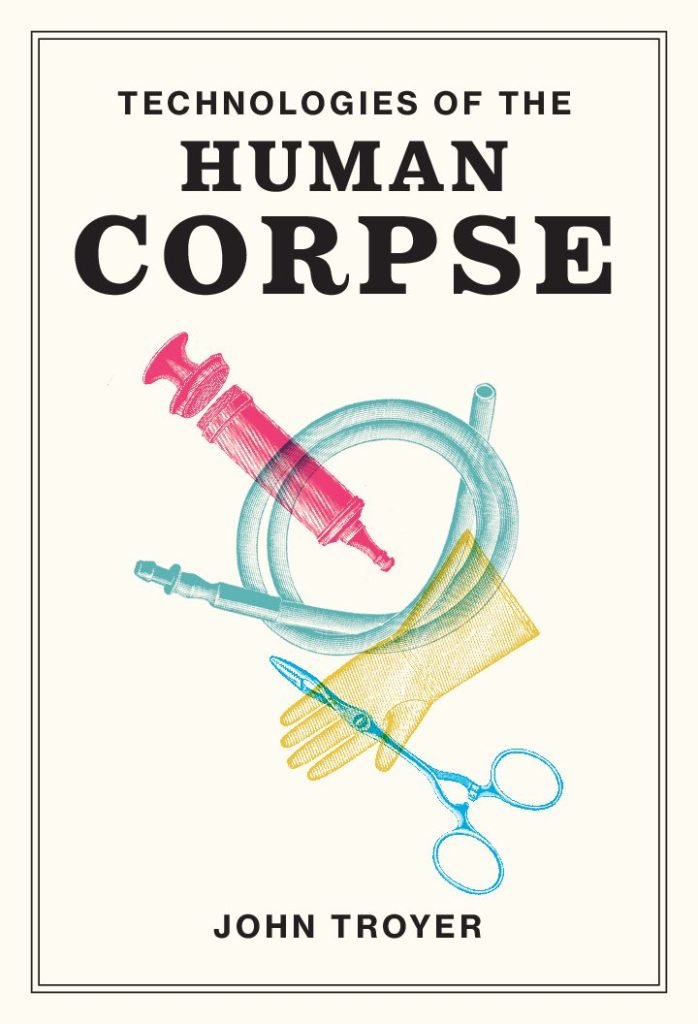
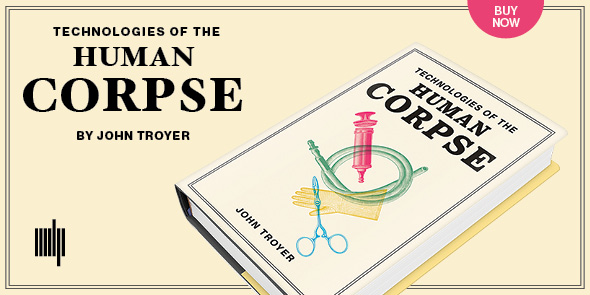
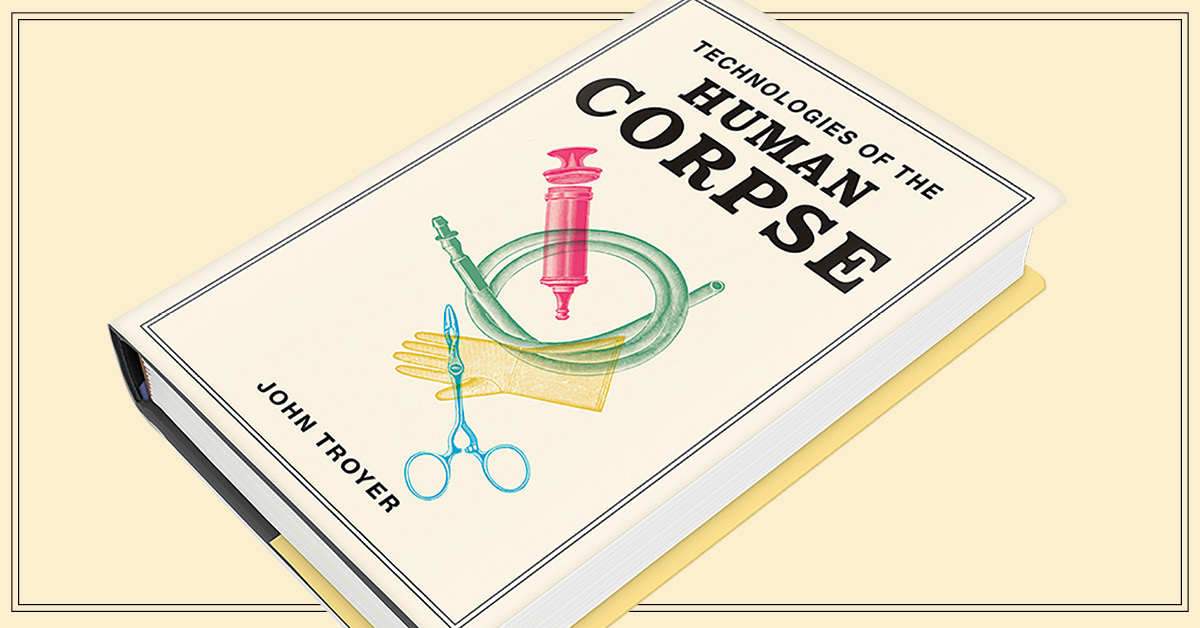


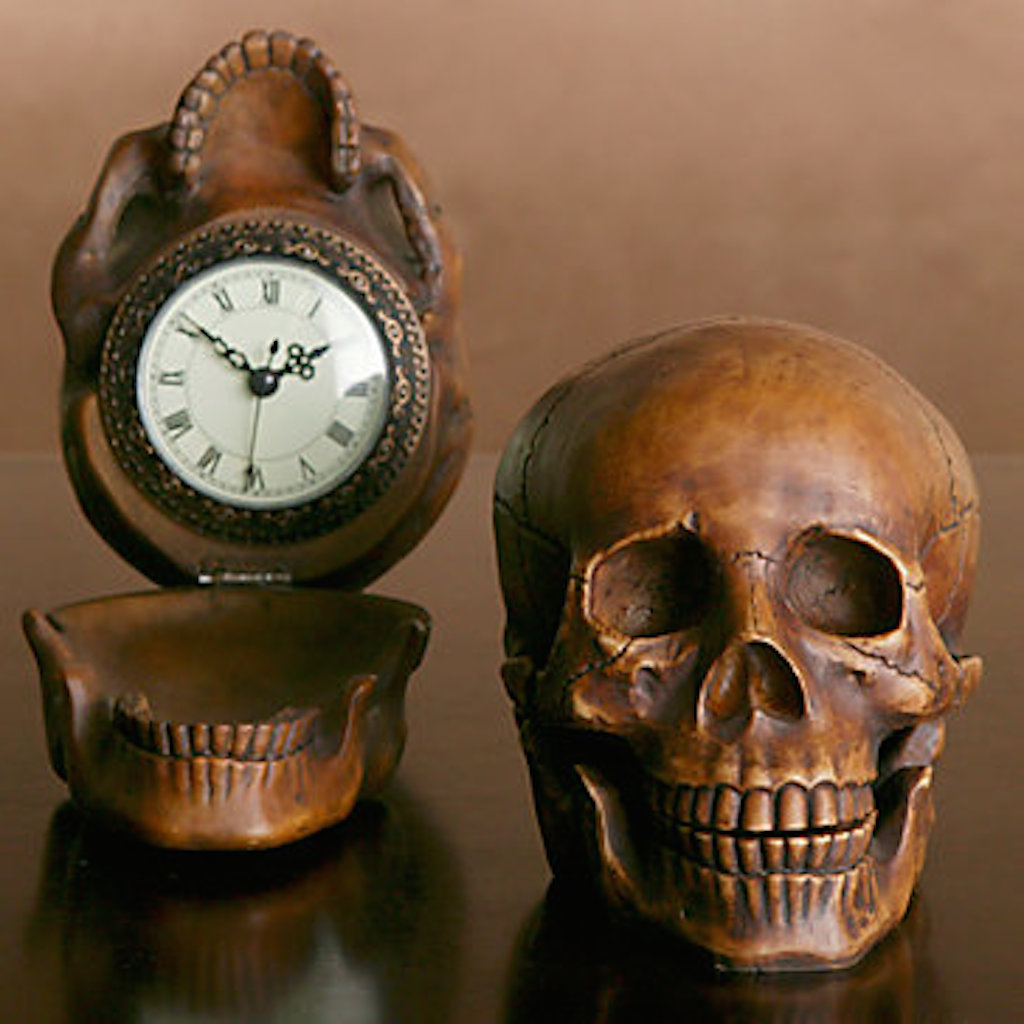
2016 will very likely be remembered as the year of the Dead Celebrity. Prince was certainly a tough death for Death Ref.
And yet, a plethora of other articles and radio programmes on diverse death topics also appeared in 2016. This is not to belittle everything written about Dead Celebrities, but we here at the Death Reference Desk want to highlight some of the year’s most compelling pieces on non-celebrity death, dying, and dead bodies.
Death Ref started running a year end feature last year. As with the 2015 list, many of the 2016 pieces came from the New York Times, which continues to produce really good essays and articles on human mortality.
Collecting the 2016 material was a bit more systematic than last year. Throughout 2016 articles were placed in a folder that was then reviewed. By today, December 31, 2016, there were over forty different items in that folder.
What follows below is a sampling of those essays, articles, and radio stories.
It was good to see so many articles in 2016 about the legacy of AIDS and the political movements that formed around the Epidemic in the 1980s and 1990s. A couple of pieces towards the bottom of the 2016 list highlighted this forgotten, but crucial history. Death Ref also recommends that everyone signs-up for the BBC Radio 4 We Need To Talk About Death podcast. The shows started at the end of 2016 and will continue into 2017. Finally, we were saddened to learn that our good friends at the Morbid Anatomy Museum closed its doors in December. Death Ref John was the MAM’s Scholar in Residence in 2014 and you can read his essay about the Morbid Anatomy Museum here.
As with last year, that’s it for 2016. The Death Reference Desk (Meg, Kim, and John) all look forward to 2017 and what will most certainly be an unpredictable year for death.
For Martin Luther King’s Birthday, Black Leaders as Obituaries Portrayed Them
by Sam Roberts, New York Times (January 18, 2016)
To commemorate the birthday of the Rev. Dr. Martin Luther King Jr. — he would have been 87 — in advance of Black History Month in February, The New York Times culled its historical obituary files for a retrospective on how he and other prominent black Americans were regarded at their deaths.
Death Predicts if People Vote for Donald Trump
by Jeff Guo, Washington Post (March 04, 2016)
It seems that Donald Trump performed the best in places where middle-aged whites are dying the fastest.
Why Slaves’ Graves Matter
by Sandra Arnold, New York Times (April 02, 2016)
Those who lived through slavery were human beings, not abstractions.
When Your Mother’s Death Is Kept Secret From You
by Alexa Tsoulis-Reay, Science of Us (May 25, 2016)
The reverberating effects of hiding the truth.
Alton Sterling and When Black Lives Stop Mattering
by Roxanne Gay, New York Times (July 06, 2016)
Tiny cameras allow us to bear witness to injustice. What does that change?
Solving All the Wrong Problems
by Allison Arieff, New York Times (July 09, 2016)
Do we really need an app that lets us brew our coffee from anywhere?
‘Transfesto’ Launches to Tackle Transgender Discrimination After Death
by Jenny Marc, The Independent (June 30, 2016)
In 2016 researchers and activists in London released a ‘transfesto’, calling for greater awareness of issues faced by transgender, non-binary and gender nonconforming people after they die. The manifesto calls on the funeral industry to develop more trans-friendly practices and for official death-related paperwork to be more trans-inclusive. It also outlines plans to make trans-specific legal information more easily accessible.
THIRD human foot found in Bath, England
by Amanda Cameron, Bath Chronicle (August 05, 2016)
Another human foot has been discovered in Bath….(NB: Death Ref John lives in Bath and can’t get enough of these severed feet stories)
10 of the World’s Most Iconic Cemeteries, Mausoleums, and Crematoriums
by Demie Kim, Artsy (August 09, 2016)
Though we may think of cemeteries as transporting us to the past to remember and honor our loved ones, they have historically been spaces of innovation and reinvention in art, architecture, and design.
Death & The Maidens: Why Women are Working with Death
by Sarah Troop, Death and the Maiden (August 15, 2016)
Death & the Maiden’s co-founder, Sarah Troop, delves into the reasons underlying the current interest many women seem to have with death, and the rise of the Death Positive movement.
Playing God
by Radiolab (August 21, 2016)
When people are dying and you can only save some, how do you choose? Maybe you save the youngest. Or the sickest. Maybe you even just put all the names in a hat and pick at random. Would your answer change if a sick person was standing right in front of you?
On Assisted Suicide, Going Beyond ‘Do No Harm’
by Dr. Haider Javed Warraich, New York Times (November 04, 2016)
Fewer people experience a “natural death” anymore. Doctors should rethink their opposition to right-to-die laws.
LGBTQ Activist Cleve Jones: ‘I’m Well Aware How Fragile Life Is’
Terry Gross radio interview on Fresh Air (November 29, 2016)
Jones became an activist after Harvey Milk’s assassination, and he lost countless friends to the AIDS epidemic. He says, “There are some days when it is so painful that I really can barely function.”
The Reinvention of Radical Protest: Life on the Frontline of the AIDS Epidemic
by David France, The Guardian Long Read (November 29, 2016)
As reports of a mysterious plague swept through the gay community in the 1980s, activists developed shock tactics to get the support they desperately needed.
America Is Failing the Bad-Break Test and People Are Dying
by Jesse Singal, Science of Us (December 09, 2016)
The United States likes to view itself as a singular force of prosperity and opportunity, but by many public-health metrics — including infant mortality and preventable deaths and a variety of others — it doesn’t look like a top-tier world power.
The Rooms they Left Behind
by Mitch Epstein, New York Times Magazine (December 21, 2016)
After the deaths of these 10 notable people, The New York Times photographed their private spaces — as they left them.
We Need to Talk About Death
with Joan Bakewell, BBC Radio 4 (Ongoing Series started in December 2016 — download the Podcasts)
Joan Bakewell and her panel discuss death and dying, exploring the choices open to us and confronting the questions we fear the most.

2015 was a good year for death. Without much hesitation writers and editors both agreed that death topics sold copy/generated clicks so the stories kept coming all year long.
I compiled a short(ish) list of what I consider to be the most memorable critical reflections on death during 2015. It is a mix of essays, radio stories, and videos.
I created this list by asking myself what things I watched/listened to/read that really stood out in my memory. Each of these essays is worth reading. You should also listen to the This American Life radio story and watch the UK Commons debate on Assisted Dying.
It’s a bit New York Times heavy, but then I think that the Old Gray Lady really deserves credit for publishing some of the year’s best essays on death and dying. Indeed, I think everyone should be reading the NYT’s ongoing essay series on the end-of-life simply called The End.
One final 2015 highlight. In October 2015, the Bristol Museum in Bristol, England opened a remarkable and quite beautiful exhibition called Death: The Human Experience. [Full Disclosure: I was an Advisor on the exhibition] The show runs through March 13, 2016 and is FREE. I highly recommend checking it out.
That’s it for 2015. The Death Reference Desk (Meg, Kim, and John) all look forward to keeping things real and deathy in 2016.
‘The Condition of Black Life Is One of Mourning’
by Claudia Rankine, New York Times (June 22, 2015)
The murder of three men and six women at a church in Charleston is a national tragedy, but in America, the killing of black people is an unending spectacle.
Getting Grief Right
by Patrick O’Malley, New York Times (January 10, 2015)
Don’t believe what you hear about closure and ‘stages’ of mourning.
New York Times Starts New Series on Death and Dying: The End.
The Death Reference Desk (February 1, 2015)
This American Life Episode 557: Act III About that Farm Upstate
Jonathan Goldstein (MAY 15, 2015)
While it’s hard to explain to kids how babies come into the world, it might be harder to explain that people leave the world too — especially to a kid whose mom or dad or brother or sister has died. There are grief counseling centers all over the U.S. that cater specifically to children. Reporter Jonathan Goldstein visited one in Salt Lake City, The Sharing Place.
Bereavement Can Overwhelm a Student – and Support is Sparse
Louisa Ackerman, The Guardian (March 05, 2015)
Nothing can prepare you for the shock of losing someone you love. But universities ought to know how to take care of a grief-stricken student.
UK House of Commons Debate on Assisted Dying Bill
Video of Commons Debate (September 11, 2015)
The Bill seeks to enable competent adults who are terminally ill to choose to be provided with medically supervised assistance to end their own life. [Note: Click on ‘Watch Parliament TV: Assisted Dying (No. 2) Bill’ to watch the Debate].
Why ‘Natural’ Doesn’t Mean Anything Anymore
Michael Pollan, New York Times (May 03, 2015)
Whether we’re talking about food, politics or morality, we can’t agree on a definition.
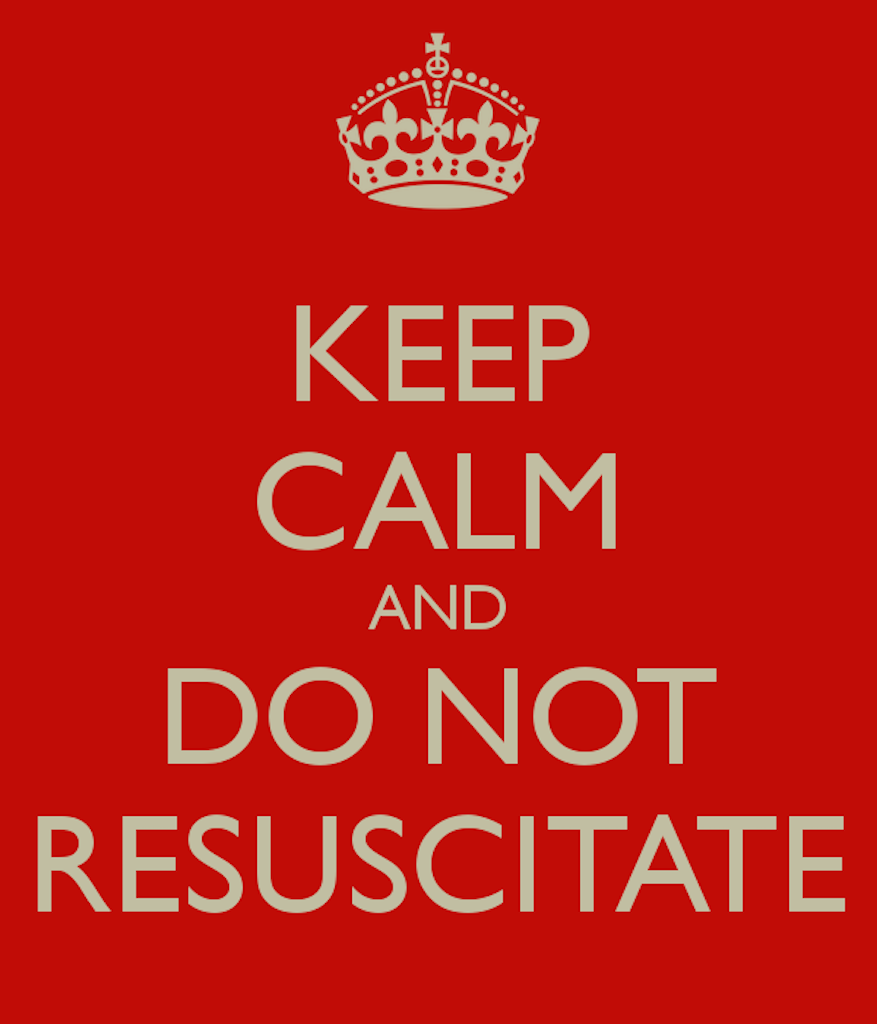
Dying Shouldn’t Be So Brutal
Ira Byock, New York Times (January 31, 2015)
Where is the public outrage over needless suffering at the end of life?
The New York Times has launched a new death and dying focused section for its Opinionator series called The End. No need to guess what The End will be about. All the news that fits to print now features:
…essays by people who work in fields dealing with death and dying, like medicine, ethics and religion, as well as personal essays by those who have experienced the death of a loved one.
It appears that the above essay by Ira Byock is The End’s first post and it’s really good. I’m hopeful that other essays for this series also tackle the politics of dying with such honesty.
Meg (Death Ref’s formatting guru and enforcer) reprimands me every time I quote long(ish) text from articles but I couldn’t resist this time. Here is a great section from Byock’s essay:
It’s high time we boomers shook off our post-menopausal and “low T” malaise and reclaimed our mojo. Remember Howard Beale, the fictional news anchor brilliantly portrayed by Peter Finch in the 1976 film “Network”? Fed up with the inequities of modern life, one night Beale exhorts viewers to go to their windows and yell, “I’m as mad as hell and I’m not going to take this anymore!” We’ll figure out the details later, he says; right now it’s time to yell. And, across the country, they do.
The persistently unsafe state of dying in America should provoke a Howard Beale moment. We’ll find solutions in various white papers and Institute of Medicine reports. First, we need outrage.
Byock also references the 1970’s hospice movement in his essay and I’m glad to see that. So much knowledge and awareness about 1970’s Death Movements has been forgotten and needs to be re-discovered. It was a moment in which choosing how to die became both personal and political.
Who knew that the Gray Lady recognised the need for something like The End. The Opinionator’s editors seem to respect and understand another of Byock’s crucial points from the essay: DYING is not easy, but it needn’t be this hard.
The Death Reference Desk will most certainly keep an eye on The End.
Coverage for End-of-Life Talks Gaining Ground
Pam Belluck, The New York Times (August 31, 2014)
Medicare may cover advance care planning that was once decried as “death panels,” and some private insurers are not waiting for the political process.
Maybe I’m being a bit unfair to the New York Times with this post’s title. It’s a good article. I recommend reading it.
That said, it should come as no surprise that patients, doctors, and even insurance companies (i.e., The MAN) want people to discuss end-of-life planning.
Most importantly, if people would momentarily stop saying that death is a taboo and that it’s a subject that nobody wants to discuss then it might actually encourage more of these end-of-life planning conversations.
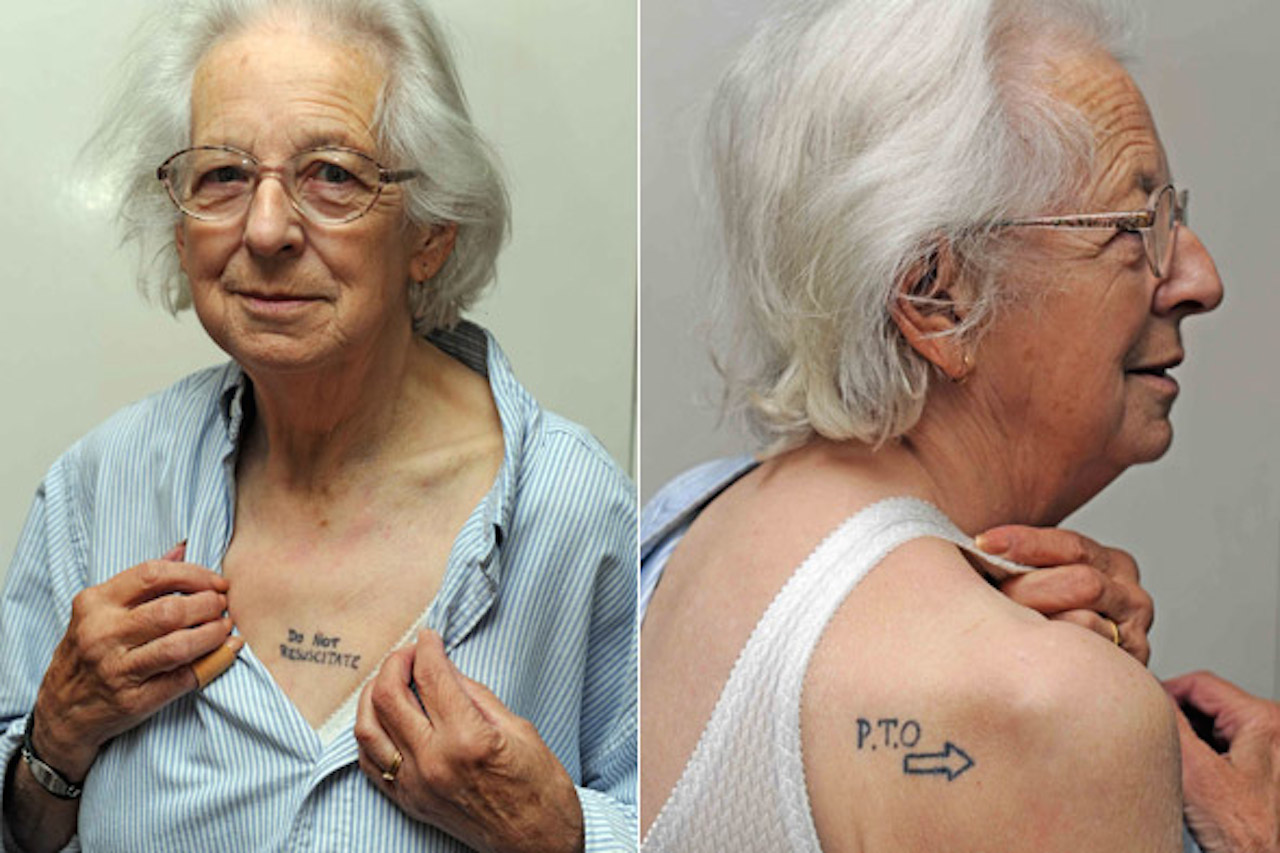
9 Things to Know About Reviving the Recently Dead
Greg Miller, Wired Magazine (July 30, 2014)
Great article in today’s Wired about research by Dr. David Casarett on methods used to revive, resuscitate, and bring back the dead. Casarett’s work is in his new book called Shocked: Adventures in Bringing Back the Recently Dead.
Interestingly, Greg Miller at Wired notes that:
Casarett is enthusiastic about the emerging technologies that are allowing doctors to save patients who would have been a lost cause in the very recent past. But these technologies come at a cost, he writes. They may restore life, but whether it’s a life worth living is another matter.
And while Casarett originally became a Doctor so that he could develop new technologies to bring back the dead, he’s now working in hospice and palliative care.
Sometimes staying dead is better than the ‘life’ a resuscitated person experiences.
The Death Reference Desk has featured a series of stories on the ins and outs of Do Not Resuscitate orders. And DNR tattoos. You can find those posts here.

Assisted Dying Bill: 2nd Reading on July 18, 2014
United Kingdom House of Lords Hansard (Published July 21, 2014)
The UK’s House of Lords has now published a full transcript, or Hansard, of its July 18, 2014 debate on assisted dying.
You can read more about that day’s debate here.
You can also catch up on all 5+ years of Death Ref’s posts on assisted dying here.
Just remember, the July 18 debate took 9 hours and 43 minutes to complete and involved 133 speakers.
The transcript is a bit long. That’s all we’re saying.
Assisted Dying Bill [HL] 2014-15
Private Members’ Bill (Starting in the House of Lords)
Sponsor: Lord Falconer of Thoroton (July 18, 2014)
It’s an over used expression, but today was an historic day in the UK’s House of Lords.
After 9 hours and 43 minutes of debate, 133 speakers (although I’ve seen the number pegged at 129), and a deluge of extremely well spoken 4 minute speeches, the House of Lords approved Lord Falconer’s Assisted Dying bill for Committee review.
The graphic at the top of the page shows where Falconer’s bill now stands, in the Committee Stage. You can also download the bill and read it in full here.
It’s hard to tell whether or not the assisted dying bill will make it out of committee and onto further debate and voting, but I’m going guess no.
The popular support for an assisted dying law remains strong in the UK (around 75%-80%) but the political will in both houses of Parliament is low.
You can read the Death Reference Desk’s complete coverage of Assisted Dying issues over the last five years here.
The Guardian also ran a really interesting infographic piece today on the numbers of people who use assisted dying laws where it’s legal to do so.
Here is a link to the House of Lords video from today’s debate. I’ve also embedded the entire debate below.
It was thrilling and exhausting to watch today’s debate. I commend all of the speakers for their professionalism and delivery. More than a few times I wondered if this kind of respectful discussion could ever occur in the US Senate.
Per usual, the Death Reference Desk will keep the updates coming.

Moral Maze: Assisted Dying
BBC Radio 4 (July 16, 2014)
The Moral Maze programme on BBC radio is a long-running show dedicated to debating and understanding complicated issues.
Yesterday’s guests heatedly discussed assisted dying, suicide, euthanasia, human autonomy, the sanctitity of life, the list goes on and on.
Well worth gving a listen before Friday’s debate in the House of Lords on the assisted dying bill for England and Wales.
Here the programme’s description:
The issue of assisted dying is the moral discussion of our age and the latest effort to get it legalised comes before the House of Lords this week. The debate has been given new energy by the intervention of two former Anglican archbishops, Desmond Tutu and George Carey, who’ve now come out in support of the right of terminally ill people to end their lives – flying the face of the teaching of their church. There are a plethora of moral principles at stake and at the heart of them, which all sides acknowledge, the terrible suffering that some people go through at the end of their lives. What are the moral, ethical, philosophical and religious principles at stake in this debate? What happens when two moral principles collide and both sides could be right? What moral calculus can you apply to decide how to choose between right and wrong?
Featured speakers include Dr. Iain Brassington, Dr. Kevin Yuill, Professor Raymond Tallis and Professor Margaret Somerville.
David Cameron ‘not convinced’ over assisted dying bill
PM speaks of worry about legalising euthanasia, but says he would be very happy for Commons to debate issue
Rowena Mason and Agencies, The Guardian (July 16, 2014)
Today saw another interesting development in the lead up to Friday’s debate on assisted dying in the UK’s House of Lords.
Prime Minister David Cameron was asked about the upcoming debate during the weekly Prime Minister’s Questions (PMQs). The Prime Minister is asked everything and anything by members of parliament during the PMQs and, in theory, has to quickly formulate some kind of response.
His answer to the assisted dying question was intriguing. He made it clear that he thought the debate should move forward but that he personally didn’t support a change to the law.
He used the word ‘euthanasia’ in his response, which is a key word choice. The House of Lords is debating an assisted dying law, not a euthanasia law. Assisted dying laws usually mean a person is given a lethal dose of a drug and then that person has to physically administer and ingest the drug in order to die. Euthanasia occurs when one person puts another person to death, i.e., person A injects person B with a drug so that person B will die.
The words make a significant legal difference for any kind of death with dignity law.
You can watch video of the entire (relatively short) exchange starting at 28:20.
I also suggest watching the faces and reactions of the other MPs. It seems that right now many MPs would rather debate anything other than a law on assisted dying. This could change after Friday.

Assisted dying: leading doctors call on Lords to back legalisation
Twenty-seven leading figures write to every peer urging them to back Lord Falconer’s private members bill on assisted dying
Denis Campbell and Dominic Smith, The Guardian (July 15, 2014)
Church of England split over assisted dying as debate looms
Consensus on women bishops set aside as Lords examine Falconer’s bill, after support from Desmond Tutu and Lord Carey
Andrew Brown, The Guardian (July 15, 2014)
Yesterday’s 31 Days of Death post focused on the upcoming UK House of Lords debate on legalising assisted dying in England and Wales.
This entire week might become about Friday’s debate, so I’m turning today’s post into an update.
Two interesting developments.
A group of 27 medical authorities wrote letters to every House of Lord’s member encouraging them to support the proposed bill. This kind of letter writing campaign has happened before but this time it’s part of a larger shift in which slowly but surely religious leaders who support a change to the law are now speaking out. I focused on religion, in particular, yesterday.
The religious debate brings me to the second of today’s articles. The Church of England currently finds itself in a debate that I’m not entirely sure it expected before Friday’s debate. Before the week is out, I think that more Anglican supporters of assisted dying might make their support known. As I said yesterday, this theology discussion is extremely important to have in order to facilitate as a discussion about religious beliefs.
On the upside for the Church of England: women can now be Bishops, so at least that’s something.
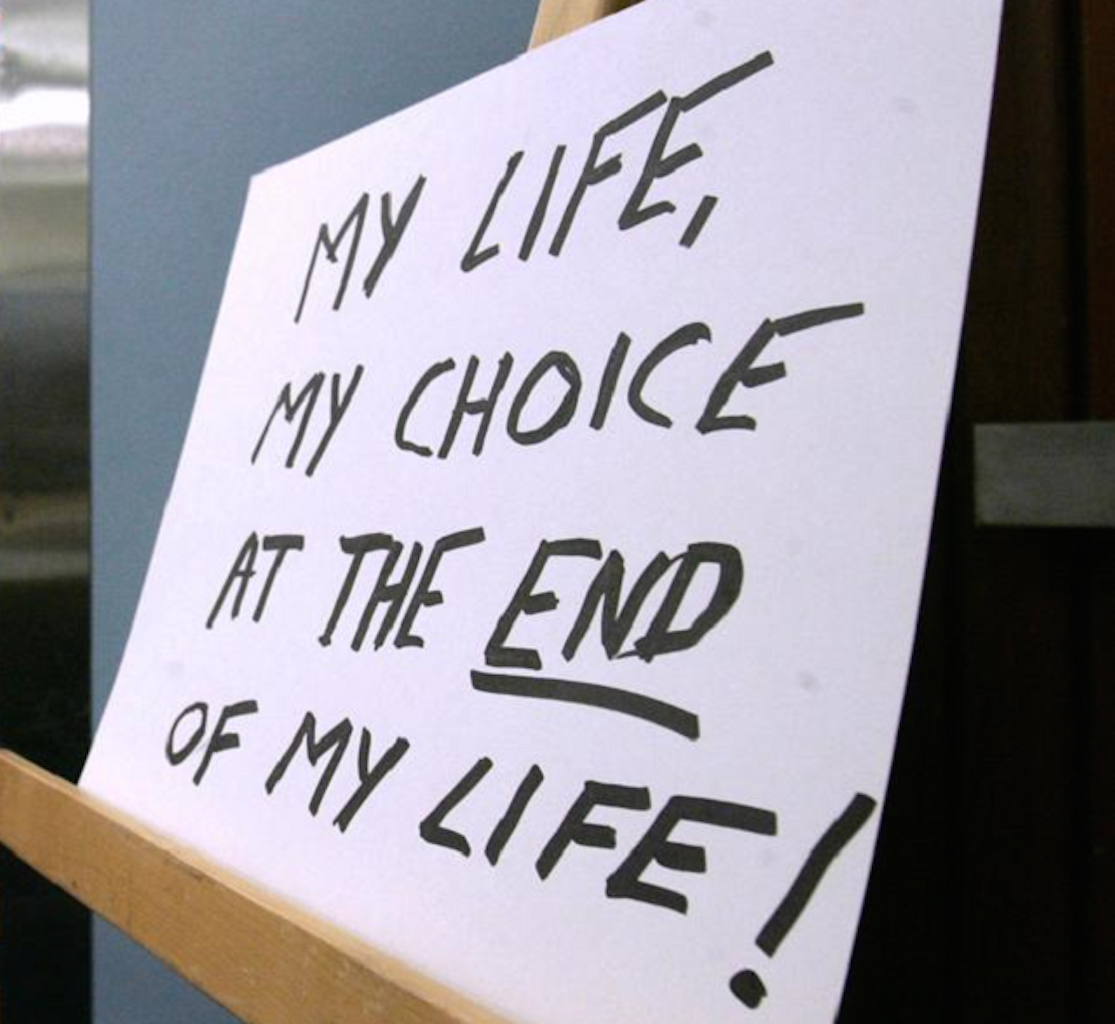
Religious activists have too much say over our right to die
The question of assisted dying needs to be discussed rationally and not held to ransom by minority zealots
Catherine Bennett, The Observer (July 05, 2014)
Former archbishop lends his support to campaign to legalise right to die
Carey says assisted dying proposal is way of preventing ‘needless suffering’ and helping terminally ill ‘not anti-Christian’
Nicholas Watt, The Guardian (July 12, 2014)
Church of England seeks inquiry over bill to legalise assisted dying
Bishop of Carlisle says church was ‘surprised’ by former archibishop’s support for Falconer Bill
Nicholas Watt and Shane Hickey, The Guardian (July 12, 2014)
Why I’m in favour of assisted dying
I have spent my life working for dignity for the living. Now I wish to apply my mind to dignity for the dying
Desmond Tutu, The Observer (July 13, 2014)
Assisted dying: change the law so that the terminally ill die with dignity
If the assisted dying bill becomes law, it will put an end to prolonged suffering
Observer Editorial, The Observer (July 12, 2014)
Parliament turns back to the question of assisted dying
The House of Lords is to debate Lord Falconer’s bill aimed at clarifying the law on the right to end one’s life
Daniel Boffey, The Observer (July 13, 2014)
Assisted dying has been legal in Oregon since 1997, but it remains surrounded by taboos
One woman described her husband’s death as ‘beautiful’, but many still believe it is morally wrong
Andrew Gumbel, The Observer (July 12, 2014)
Assisted dying bill must not stall in Lords, urges former lord chancellor
Lord Falconer of Thoroton calls on supporters to vote down any attempt to pass wrecking amendment on sensitive issue
Nicholas Watt, The Guardian (July 13, 2014)
This is an important week for Assisted Dying in England and Wales.
A bill brought forward in the House of Lords by Lord Faloner, and modeled on the Death with Dignity Act in Oregon will be debated this coming Friday, July 18, 2014.
The backstory on this proposed law is long and arduous. It’s also something that Death Ref has been closely following since 2009.
You can catch up on those stories with the Assisted Dying and Death with Dignity tags. You can also look through the Death + the Law category
What is most interesting about the upcoming debate is the sudden inclusion of religion into the discussion, and by individuals who support the bill based on religious beliefs. The articles at the top on former Church of England Archbishop Carey and the personal essay by Desmond Tutu threw significant theological weight behind support for the assisted dying bill.
One of the major differences between the US and UK when discussing assisted dying is the role of religion. In the US, I know quite quickly if a person opposes assisted dying for religious reasons. Interestingly enough, a number of libertarian leaning US Conservatives strongly support assisted dying, but it’s the fundamentalist Christian Conservative community that most vocally opposes it.
In the UK, the theological reasons aren’t that obvious even though religious beliefs often inform how a person thinks. The very first op/ed column by Catherine Bennett highlights how some UK Christian groups that oppose assisted dying make a point of setting aside their theological language in the hopes of not alienating non-religious (or Christian) people.
It’s important to know and understand if an individual is opposed to assisted dying for religious reasons so that you can then have a discussion about theology. Otherwise the discussion is about the law, which is a secular, human invention. The statements of support by former Archbishops Carey and Tutu have made that necessary theological conversation possible.
I’m not entirely sure what will happen this week but the Death Reference Desk will follow the events and post updates.